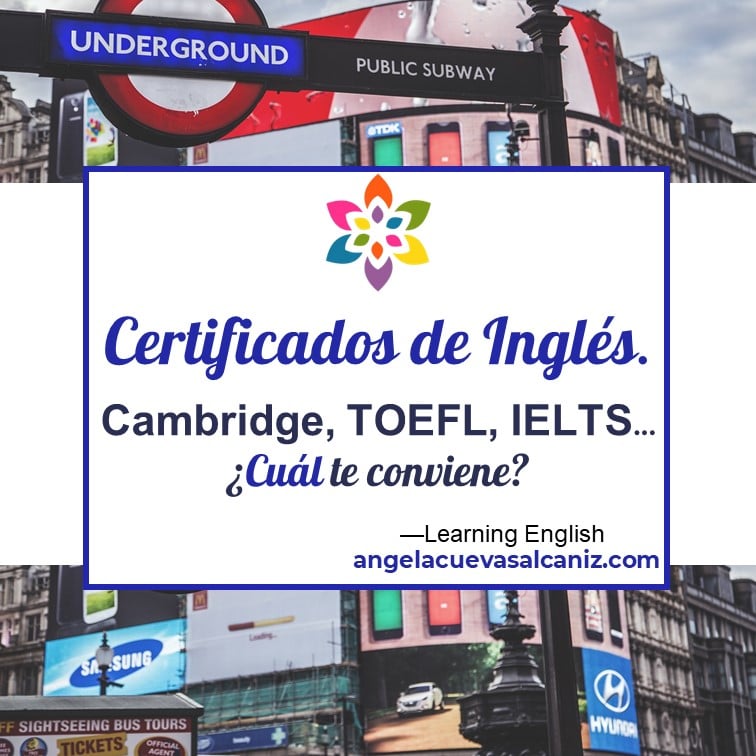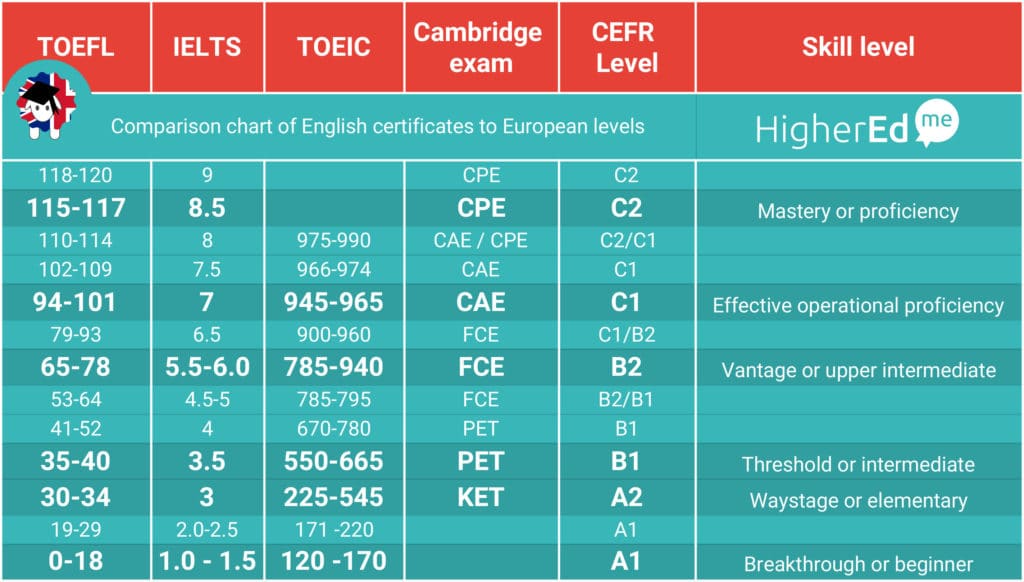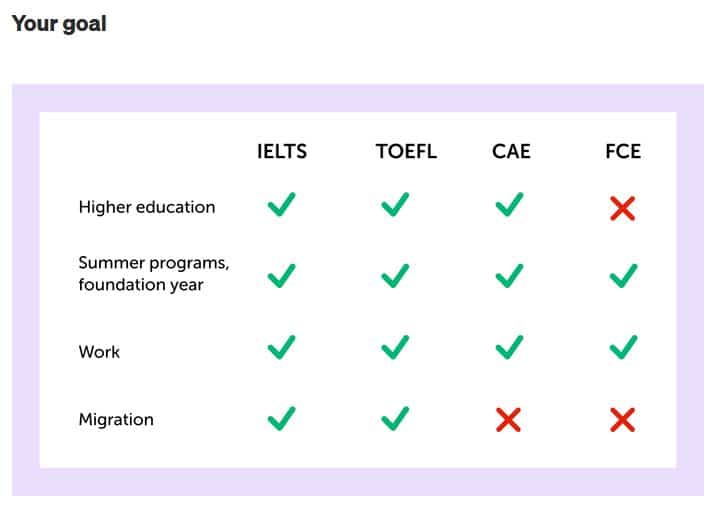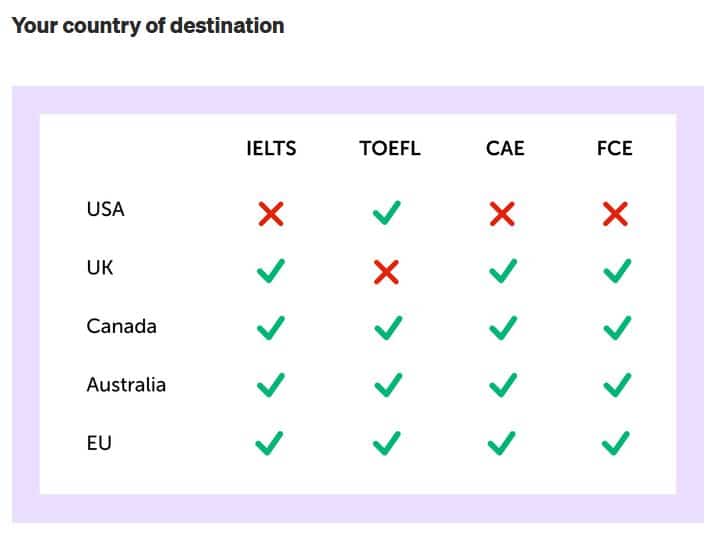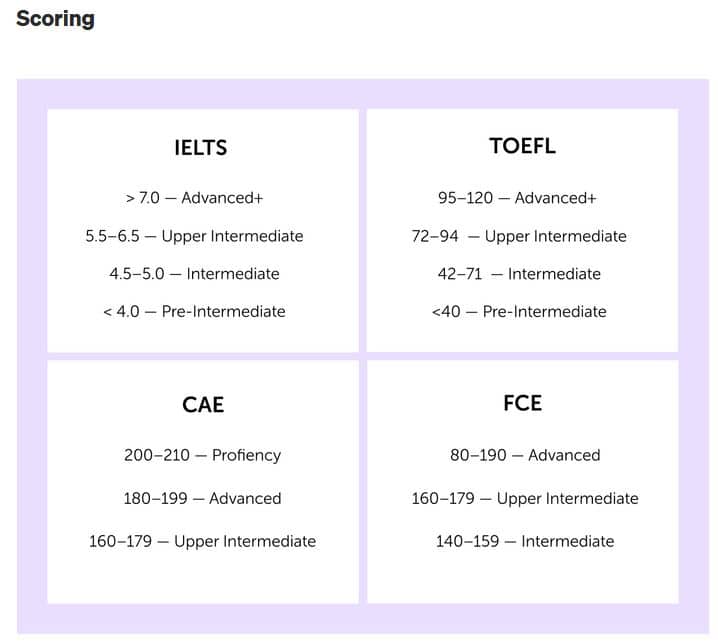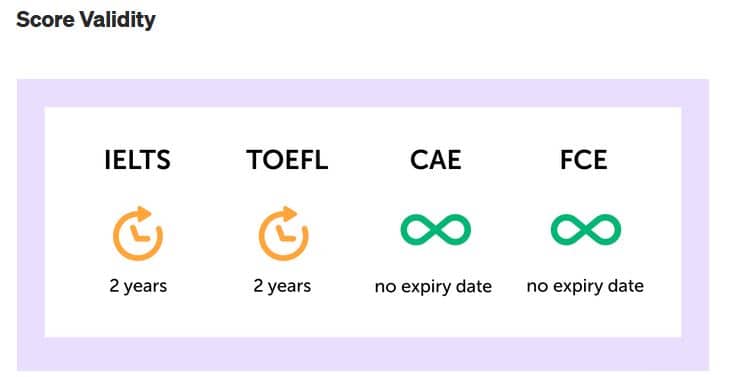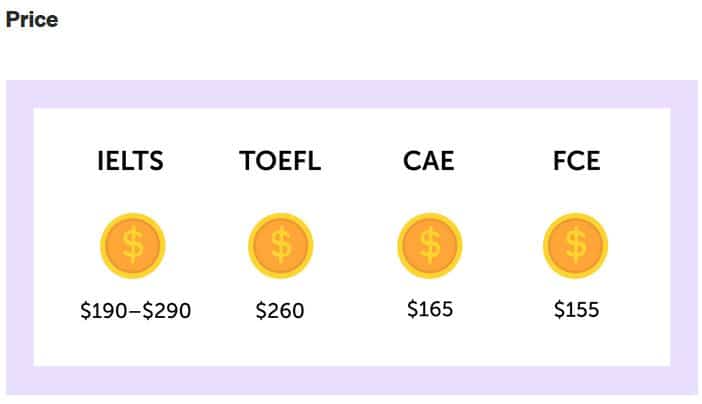We know what we are here for: we want to pass a language exam to get a certification once and for all. We may need it to get a university degree, we may want to study or work abroad, we may fancy the challenge, or we may want to have it for any other reason.
Depending on what we want, the logical thing would be to opt for one type of exam or another. In this post I leave you the different types of exams, what each one is for, and the differences between them. I have gathered the information about all these different types of certifications here to have it all organized in one place, and not have to search on seven different pages, as I have had to do.
It may also be useful if any of you have come here looking for information about what exam you will be asked to take next year when you go on an exchange to Australia, for example.
As this is a rehash, blatant copy-paste of several articlesI'll put where I got each extract from in parentheses. You'll find the list of references at the end. Kisses.
Notice to sailors: The exams that I am going to take as a reference on this page to “prepare” you are going to be those of cambridge. Why is this? Well, because I imagine that if you are here it is, above all, for what I mentioned in my previous video: to get the B1 and/or B2, mainly, and Cambridge offers just that: to get the specific level certificate. Apart from the fact that they are the ones I have the most experience with… Of course, the Grammar, Vocabulary, Reading, Writing, Listening and Speaking They are common to almost all exams, so you can also take advantage of them even if you are thinking of taking exams other than Cambridge. ????
PS. Here I'm leaving you the dates and prices of the Cambridge exams this year in Spain, which is good to know as well. ????
(The Country)
[It is clear that] “Taking one of these exams to try your luck is pointless, it is a waste of time and money. It is important to know how the levels of the exam work. Common European Framework of Reference for Languages and make a good decision.” “Exams are given for specific reasons, they should not be given without a specific objective.”
The two most internationally recognized certificates are the TOEFL and the IELTS, the first one American and the second British and Australian. Both are useful in the work and academic fields. To cite an example, one of the requirements of the Fulbright program, which offers scholarships to international students to study postgraduate courses in different specialties at American universities, is to have obtained a minimum score of seven on the IELTS or 100 on the TOEFL, provided that the test has been passed within a maximum period of two years prior to the date of the call for applications. In the United Kingdom, most universities require a minimum of six on the IELTS to be able to enroll in a degree or postgraduate program.
In Spain the most well-known certificates are the First, Advanced and Proficiency the ePub version of Cambridge EnglishBelow is a guide with the keys for each of these certificates.
1. IELTS (International English Language Testing System)
They started it in 1989 University of Cambridge, British Council and IDP Australia Together with the TOEFL, it is the most widely used language test in the world. In 2013, 2.5 million people took the test, 1.5 million of them in Asia. The main difference with the TOEFL is that the test is in person (not online) and the oral part is done face to face with a teacher. The British Council is the only accredited entity in Spain to carry out these tests, which are held in a few days. 60 times a year in 30 cities across the countryThere are two types: Academic, which is the most widely used, and General Training, which is more closely linked to the workplace. Both consist of the four basic parts Reading, Writing, Listening and Speaking. This is a test that measures language skills with a score ranging from 1 to 9 (certifying from A1 to C2). It is not a pass or fail test, but rather an indication of the student's level of English. The results are obtained 13 days after the test is taken and the price is 205 eurosIn Spain it is used to certify the level of English in different contexts: competitive examinations, university (it appears on the list of certificates approved by the English Linguistic Board of the Conference of Rectors of Spanish Universities (CRUE) or for those teachers who want to teach in bilingual schools.
2. TOEFL (Test of English as a Foreign Language)
It is the oldest certificate. It was launched by Educational Testing Service (ETS), an American nonprofit educational organization, in 1964. More than 5,000 higher education institutions, universities, certification agencies, and exchange programs 130 countries in the world accept TOEFL results The TOEFL iBT® test is offered over 50 times a year at approved test centres around the world. It is useful for both academic and professional use, especially in the United States. The registration fee is $1,000 per year. The TOEFL iBT® test is offered over 50 times a year at approved test centres around the world. It is useful for both academic and professional use, especially in the United States. The registration fee is $1,000 per year. 198 euros ($245).
3. Cambridge English Language Assessment: KET, PET, First, Advanced, Proficiency
These certificates are recognised by more than 15,000 universities, employers and governments on a global scale, says Cambridge English. on their website. In Spain, these are the best known. The main difference with the previous ones is that each one consists of a specific grammar and the exam is passed or failed. They are valid permanently, you do not have to take the exam again after two years. The oral test is carried out with another student and two teachers. They certify levels from A2 to C2, in this order:
- Cambridge English Key (KET)
- Cambridge English Preliminary (PET)
- Cambridge English First (FCE)
- Cambridge English Advanced (CAE)
- Cambridge English Proficiency (CPE)
In the case of the KET and PET, the student needs to obtain a grade higher than seven out of 10 to pass. In the rest, a six out of 10. These certificates have also been approved by the CRUE English Linguistic Board.
Other types of certifications are (info of TEC Languages and of Viva-World):
Pearson Test (PTE)
The Pearson Test of English (PTE) is a communicative exam that assesses the four language skills: listening, reading, speaking and writing.
The English Certificate is awarded by the largest body in the United Kingdom, Edexcel, and accredited by Ofqual, the Office for the Regulation of Qualifications and Examinations in England. Therefore, it is an official exam recognized internationally by many universities, companies, public institutions, etc. In addition, PTE certificates do not expire.
The English level exam format is made up of two parts; the written test and the oral test. In addition, the PTE exam can only be taken at official centers accredited by Pearson. The different levels you will find are:
Level A1 -> A1
Level 1 -> A2
Level 2 -> B1
Level 3 -> B2
Level 4 -> C1
Level 5 -> C2
One aim of the different levels of PTE General English is to motivate students to progress and pass the different exams. The first levels are suitable for young people aged 12 and over and adults. The following levels (4 and 5) are focused on the student's need to be admitted to different UK universities and international companies, as this is often an admission criterion.
The exam consists of two main parts, written and oral. The written part includes listening, reading and writing; the oral part consists mainly of a conversation with the examiner, in which there will be four different sections to detect the exact level of the examinee.
The maximum score for the exam is 100 points, so each section (listening, reading, writing and speaking) has a maximum of 25 points. To pass the exam, you must obtain at least 50 points, although it is not necessary to reach a minimum score in each section.
Pearson Test of Academic English (PTE Academic)
This is a very recent English test known for its fast and reliable results, with results after five business days and security measures such as palm scanning and forensic data.
While this test is available in over 50 countries and can be accepted for Australian and New Zealand student visas, it is not as widely accepted as the TOEFL or IELTS. However, it is still a suitable qualification for many undergraduate, graduate and MBA students.
The exam lasts three hours and is made up of 20 different types of tasks, based on speaking, writing, reading and listening, which specifically involve a series of real-life situations. Like the TOEFL iBT test, it is taken on a computer.
Those who take the exam will receive an overall score between 1 and 90, as well as individual scores for each skill area.
The Pearson General English Test we saw above is not as widely recognised by universities or border controls as the Academic Exam.
Educaweb also mentions Oxford:
He Oxford Test of English It is a certificate issued by the University of Oxford.
It is aimed at certifying English to meet the academic requirements for access to a large number of educational institutions, universities and organizations around the world. In Spain, it is recognized by ACLES and by most Spanish universities. Likewise, it is recognized by companies and is useful for demonstrating your level of English in job selection processes and professional environments.
This is a multi-level and adaptive test, which configures the questions to suit the user's level; and it is modular, with which you can choose to take the tests of the different areas of language use independently. The test is carried out online at authorized centers.
The Oxford Test of English assesses speaking, listening, writing and reading skills. Results are presented separately for each of the four skills and as a whole.
The score for this exam ranges from 51 to 140 points, and is independent for each test. An average overall score is obtained if all parts are completed. There is a correspondence between these scores and the Common European Framework of Reference for Languages, which ranges from level A2 to B2.
But it doesn't stop there...
Trinity Exam (GESE, ISE, SEW)
Trinity College London is a highly prestigious examination centre in the UK that operates internationally. It offers three different types of exams: GESE, ISE and SEW; and the types of English qualifications obtained with these exams are recognised by the educational sector (including universities) and by employers (particularly in the UK).
The exams GESE (Graded Examinations in Spoken English) They are only oral and consist of 12 different levels grouped into 4 stages: Initial, Elementary, Intermediate and Advanced. In addition, these types of English certifications are also accredited by Ofqual. The 12 levels that we find with their different equivalences are:
Grades 1-2 -> A1
Grades 3-4 -> A2
Grade 5 -> B1.1
Grade 6 -> B1.2
Grade 7 -> B2.1
Grades 8 -> B2.2
Grade 9 -> B2.3
Grade 10 -> C1.1
Grade 11 -> C1.2
Grade 12 -> C2
At each stage we will encounter a new exam, that is, as we advance through the different levels of the GESE, the demands on the examinee are greater, with different tests, which encourages student progression.
The exams ISE (Integrated Skills in English) They are aimed at students, and therefore have a structure very similar to the Cambridge exams. The English level exam has two modules, each of which has two parts.
A first module consisting of Reading and Writing, and a second module consisting of Speaking and Reading. The levels of English that we find at ISE are:
ISE Foundation -> A2
ISE I -> B1
ISE II -> B2
ISE III -> C1
ISE IV -> C2
English certifications assess the student's ability to interact in English in written and oral form and are focused on the student's real-life application. The exam modules can be taken together or separately, and at different times. However, to obtain the certificate you must complete both modules.
The exams SEW (Spoken English for Work) are aimed at professionals, and therefore at the working environment. This English level exam prepares candidates for situations they will face in their workplace, such as project presentations. There are 4 levels in the SEW: B1, B2, B2+ and C1.
And, as he tells us, Viva-World, there are others…
Other Certifications
Although the ones we have already seen are the most widely accepted English language certifications, there are many other certifications for English as a second language speakers that can be offered and accepted by various universities and student visa applications. These include:
Ascentis
Ascentis is a company that offers a wide variety of certifications, from employability skills to courses on British values. As such, they also offer English proficiency tests for all ages and levels.
However, the certifications Ascentis offers cover fewer topics than those offered by TOEFL or IELTS and are more focused on those who wish to study and work in the UK. That being said, they do offer a wide range of certifications, so you can go from speaking no English to high school level English to functional English with Ascentis.
City and Guilds (C&G)
There are eight international qualifications available from City and Guilds for English: one for Business Communications and the rest in General English.
The best known is perhaps the International Certificate in English Language, which is intended for non-native English speakers worldwide; people who need English for their everyday or working lives; students who require externally recognised certification of their English language levels; and those who require a series of levelled examinations to provide steps up the language proficiency ladder.
Like other English qualifications, there are five sections: Speaking, Listening, Reading, Writing and Vocabulary.
In addition, they offer certifications for young learners, teachers of English and spoken English.
English Speaking Board International (ESB)
The ESB has testing centres around the world, offering certifications focused on communication skills at school, university and throughout life.
ESB qualifications focus on effective communication skills, with a practical emphasis, with a history of providing high-quality, flexible assessments. They offer English language qualifications in a wide range, from debate to group conversation, and from interview skills to professional learning.
For international students, they offer the ESOL International suite of qualifications. ESB ESOL International qualifications are designed for students who are not native English speakers and who wish to obtain a high-quality, internationally recognised qualification. It is linked to the Common European Framework of Reference for Languages (CEFR) and is designed for students who can communicate independently in English. The 2 hour 30 minute exam is externally assessed and consists of listening, reading, use of English and writing. The speaking test is conducted separately and candidates are assessed in pairs.
London Chamber of Commerce and Industry (LCCI)
The London Chamber of Commerce and Industry is owned by Pearson, one of Britain's largest educational companies, which awards many of the country's standard academic qualifications.
English language certifications for international students are under the LCCI brand, whose certifications are used by employers and universities around the world as evidence of language proficiency.
Aligned to the Common European Framework (MER), its English language range mainly covers English for business students, including commerce, tourism, industry and accounting.
For non-native English speakers, the LCCI offers a series of tests JETSET ESOL, covering listening, reading, writing and speaking, and offering a high-quality English certification available and recognised worldwide.
Password
Password is an English language testing company that, rather than providing English tests to individuals, partners with hundreds of universities, colleges, schools and employers who want to provide high-quality online testing.
They offer a variety of tests, including employability and math tests, as well as tests for younger learners. There are two tests that English learners can take: the Password Skills Test and the Password Knowledge and Writing Test.
The skills test consists of four test modules: reading, writing, listening and speaking. The test takes a little over three hours in total.
The Knowledge and Writing test is made up of two modules, with Password Knowledge taking one hour and being a sophisticated test of grammar, vocabulary and reading. The Password Writing test assesses the ability to write an essay. You can choose from two essay titles and write at least 200 words in 30 minutes.
Teaching Knowledge Test (TKT)
The Teaching Knowledge Test is also administered by Cambridge, although it is specifically designed to demonstrate your ability to teach English with a globally recognised certificate, accepted in over 60 countries.
In it Teaching Knowledge Test (TKT), you will learn English for a variety of different teaching methodologies, you will know how to use English teaching resources effectively, you will understand the key aspects of lesson planning and you will be able to use different classroom management methods for different needs. The certification is for teaching English to both young learners and adults.
There are five modules and you can take as many as you like, at your own pace. You receive a certificate for each module you complete. Once you have passed the TKT, you can also take another Cambridge teaching qualification, such as ICELT and Delta.
Test of Legal English Skills (TOLES)
As the name suggests, Test of Legal English Skills is to improve English for the legal world. The exam is made up of three levels: basic, advanced and advanced. The exam levels are progressive steps to reach the level of legal English required by employers such as international trade law firms, in-house legal teams in private companies and top-level translators.
The TOLES materials and exams have been developed following the advice of experienced business lawyers. The main requirements for employers are excellent writing skills, first-class negotiation skills and a strong sense of commercial awareness.
TOLES has training and testing centres around the world, in South America, North America, Europe, Africa and Asia. For a full list of registered testing centres, please click here.
If you've made it this far, you're my heroes. ✊????
Let me know if you have any questions or anything else you'd like.
Good afternoon! ????
Sources:
● (THE COUNTRY)TOEFL or IELTS? How to choose the best English certificate
● (VIVA-WORLD) Which English Language Certification is Right for Me?
● (TEC Languages) Types of English certifications: what level do they correspond to?
● (CAMBRIDGE SCHOOL) Cambridge: List of Official Exams in Spain in 2022
● (EDUCAWEB) Academic Guidance — English Certificates and Qualifications
● (MEDIUM.COM) IELTS, TOEFL, CAE, or FCE: How to Choose an English Language Test

